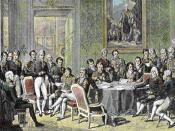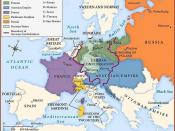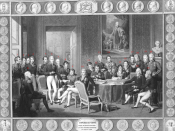In its immediate aftermath, the famous description, "le Congres ne marche pas; il danse" ('the Congress does not work; it dances') was often seen as the most accurate summary of the events taking place during the Congress of Vienna in 1815. Beneath the façade of all the reveling, this gathering of diplomats marked the end of the Napoleonic Wars and the turmoil they wrought on Europe, reshaping the order and structure of the continent in its legacy. With Austria, Great Britain, France, Prussia, and Russia playing the lead roles in the Congress while the rest of the world essentially watched, the two foremost concerns in Vienna were the containment of France, and the restoration of peace and balance of power to Europe. In redrawing the continent's political landscape after the defeat of Napoleonic France the previous spring, the members managed to successfully redesign Europe into a stable and secure block.
The landmark settlement also represented a turning point in the history if international relations, with the Congress serving as more than the usual post-war divvying up of the spoils, but the states were collectively able to at least partially set aside their own agendas for the well being of Europe as a whole, which was most clearly demonstrated in the dealings of the victorious powers with France, as well as the Congress' handing of the Polish-Saxon Crisis. The commitment to maintaining the balance of power led to the formation of the Concert of Europe, predecessor to the United Nations, and further solidified the long-term well-being of Europe. In doing so, one of the most noticeable results in its aftermath was a major conservative victory over liberal/nationalists, evident with the effort towards crushing future rebellions, reinstating monarchies, and maintenance of the status quo. Overall, the Congress of Vienna successfully achieved...


